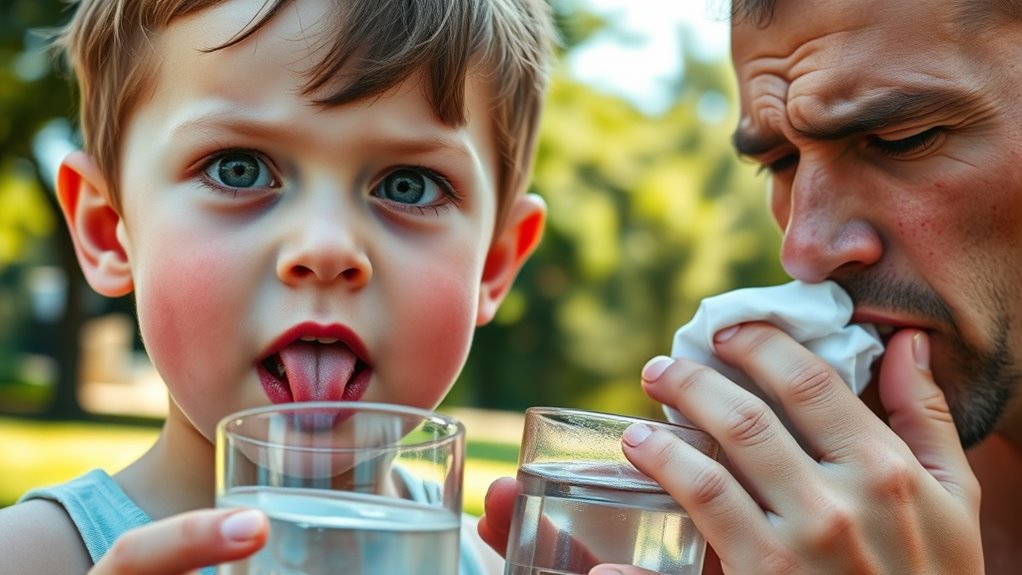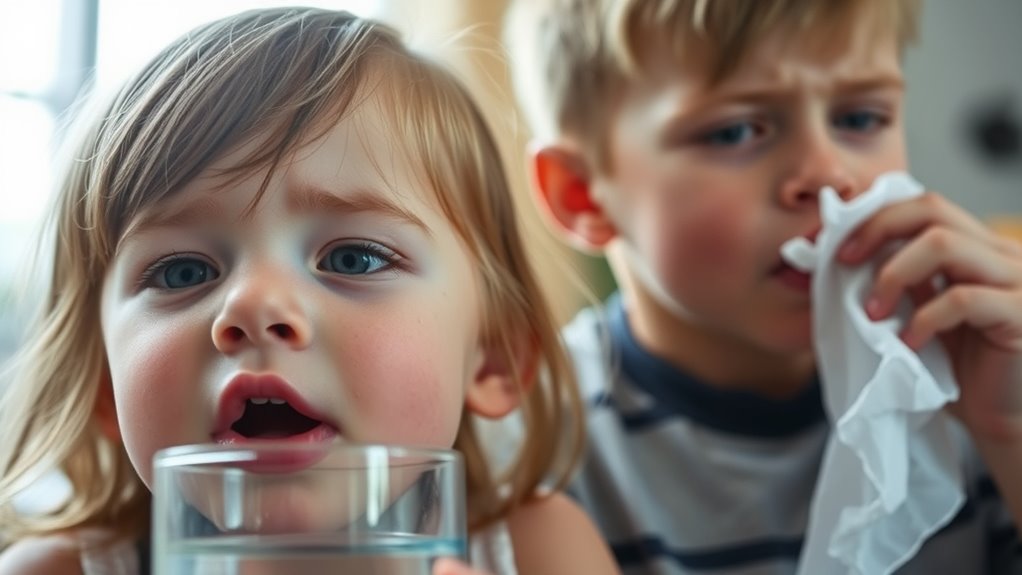To beat summer dry-mouth in kids and adults, stay well-hydrated by drinking plenty of water and hydrating drinks like electrolyte solutions. Incorporate moisture-rich fruits and vegetables such as watermelon, cucumbers, and oranges into your meals. Avoid dehydrating beverages like sodas, energy drinks, and alcohol. Practice good oral hygiene, use saliva-stimulating products like sugar-free gum, and create a humid environment at home. Keep these tips in mind to stay comfortable—more practical advice awaits if you explore further.
Key Takeaways
- Maintain adequate hydration by encouraging frequent water intake and consuming moisture-rich fruits and vegetables.
- Use saliva-stimulating products like sugar-free gum or lozenges to increase saliva flow.
- Create a humid environment with humidifiers or water bowls to reduce indoor dryness.
- Practice good oral hygiene and avoid dehydrating foods, caffeine, and alcohol.
- Recognize signs of dehydration or underlying health issues and consult healthcare professionals if symptoms persist.
Understanding Why Dry Mouth Occurs During Summer

During summer, dry mouth becomes more common because hot weather causes your body to lose more fluids through sweating. The intense summer heat increases your body’s temperature, prompting you to sweat more to cool down. As you sweat, you shed essential fluids, leading to dehydration if you don’t hydrate properly. This fluid loss results in saliva reduction, making your mouth feel dry and uncomfortable. Saliva plays a fundamental role in keeping your mouth moist and protecting against bacteria. When saliva production drops due to dehydration, dry mouth symptoms become more noticeable. Staying hydrated and drinking plenty of water helps counteract the effects of summer heat on saliva production, reducing dryness and keeping your mouth comfortable during hot days. Additionally, contrast ratio in home projectors can influence how well visual cues remind you to stay hydrated during long outdoor activities.
Recognizing Signs of Dehydration and Dry Mouth in Kids and Adults

Recognizing the signs of dehydration and dry mouth is essential for both kids and adults, especially during hot weather or after periods of increased activity. Look for symptoms like dry, sticky mouth, cracked lips, and a sore throat. You might notice less saliva, making swallowing difficult or uncomfortable—common signs of dry mouth. In summer skincare routines, pay attention to skin that feels tight or flaky, as dehydration often affects skin hydration too. Humidity control helps prevent excessive moisture loss, reducing dry mouth symptoms. If you observe dark-colored urine or dizziness, these are serious dehydration indicators requiring prompt action. Being aware of these signs allows you to address dehydration early, helping to maintain comfort and health throughout the hotter months.
Staying Hydrated With Water and Hydrating Drinks

Staying properly hydrated is essential for maintaining overall health and preventing dry mouth. Drinking plenty of water and hydrating drinks helps keep your mouth moist and supports good oral hygiene. While water is the best choice, sports drinks or electrolyte solutions can be helpful if you’re losing fluids through sweating. Be aware of hydration myths—such as the idea that you need to drink large amounts of water constantly; listen to your thirst instead. Consistent hydration aids saliva production, which is crucial for oral health and comfort. Remember, maintaining proper hydration isn’t just about water; it also involves avoiding dehydrating beverages like excessive caffeine or sugary drinks. Using air purifiers can improve indoor air quality, which may also help reduce dry mouth symptoms caused by poor air conditions. Staying well-hydrated helps you fight dry mouth and supports your overall well-being.
Incorporating Moisture-Rich Fruits and Vegetables Into Your Diet

Eating more moisture-rich fruits and vegetables can boost your hydration levels naturally, complementing your fluid intake from drinks. Incorporate fruits for hydration like watermelon, strawberries, and oranges into your snacks or meals. Juicy vegetable snacks, such as cucumber and cherry tomatoes, are also excellent choices to keep your mouth moist. These foods have high water content, helping reduce dry mouth symptoms and increase hydration without extra effort. To make it easier, consider adding fresh fruit to yogurt or enjoying veggie sticks with hummus. Their natural juiciness keeps you refreshed and supports oral moisture. Additionally, practicing vertical storage solutions can help organize your kitchen to make accessing healthy snacks easier, supporting better hydration habits. By including these options regularly, you support your body’s hydration needs efficiently and deliciously.
Avoiding Dehydrating Beverages and Foods

To prevent dry mouth, it’s important to steer clear of beverages and foods that dehydrate your body. During hot summer days, certain summer snacks and drinks can make dry mouth worse. Avoid high-sugar drinks like sodas and energy drinks, which can draw moisture from your mouth. Stay away from salty snacks such as chips and pretzels that can increase dehydration. Limit caffeine from coffee or tea, as it acts as a diuretic. Also, steer clear of alcohol, which dehydrates quickly. Focus on hydration tips like drinking water and eating moisture-rich foods. Being mindful of these dehydrating foods and drinks helps you maintain saliva flow and keeps your mouth moist, especially when enjoying summer activities. Remember, staying hydrated is key to beating summer dry mouth. Additionally, choosing electric bikes for outdoor activities can encourage more hydration through increased physical activity and enjoyment of the outdoors.
Using Sugar-Free Chewing Gums and Lozenges to Stimulate Saliva Production

Chewing sugar-free gum can help boost your saliva flow naturally, offering relief from dry mouth. Lozenges also provide moisture and stimulate salivation, making them a convenient option. Both choices can be effective tools to keep your mouth moist throughout the day.
Sugar-Free Gums Benefits
Using sugar-free gums and lozenges can effectively boost saliva production, especially for those experiencing dry mouth. Chewing sugar-free gums stimulates your salivary glands, helping to keep your mouth moist and comfortable. Plus, they support oral health by reducing plaque buildup and neutralizing acids that cause cavities. Here are some benefits of using sugar-free gums:
- Enhances natural saliva flow
- Protects against cavities and tooth decay
- Freshens breath instantly
- Supports overall oral health
- Provides a convenient, portable solution
Choosing sugar-free options is key, as they prevent tooth decay while promoting moisture. Incorporating sugar-free gums into your routine can make a noticeable difference, especially during hot summer days or when side effects from medication cause dry mouth. Regular use can also contribute to sound healing science by promoting a relaxed state and overall well-being. Keep your mouth healthy and hydrated with this simple, effective strategy.
Lozenges for Moisture
Lozenges made from sugar-free ingredients are a convenient way to stimulate saliva flow and soothe dry mouths. They act as effective mouth moisturizers and come in various lozenge varieties to suit your preferences. When choosing lozenges, look for those designed to increase saliva production, helping you stay comfortable and hydrated. These lozenges are portable, easy to use, and often contain ingredients that promote moisture and relief. Incorporating ingredients that support saliva production can lead to better hydration and oral comfort.
Maintaining Good Oral Hygiene to Prevent Discomfort

Maintaining good oral hygiene is essential in preventing dry mouth discomfort for both kids and adults. Proper oral health habits help keep your mouth moist and reduce irritation. To improve your oral hygiene, focus on:
- Regular brushing twice daily with fluoride toothpaste
- Flossing to remove food particles and plaque
- Using alcohol-free mouth rinses for breath freshening
- Staying hydrated and drinking plenty of water
- Avoiding sugary and acidic foods that can worsen dryness
These practices support saliva production and keep your mouth comfortable. Good oral hygiene not only prevents discomfort but also promotes overall oral health. By staying consistent with these habits, you can reduce dryness and enjoy fresher breath throughout the day. Remember, a clean mouth is a happy mouth!
Creating a Comfortable Environment to Minimize Dryness

Creating a comfortable environment can make a significant difference in reducing dry mouth symptoms. During summer, maintaining adequate moisture levels is essential, as low environmental humidity can worsen dryness. Use a humidifier in your home or bedroom to boost summer moisture, especially in dry or air-conditioned spaces. Keep windows open when possible to allow fresh air and natural humidity to circulate. Avoid overly air-conditioned or heated rooms, which can further dehydrate the air. Staying in a space with balanced humidity helps keep your mouth moist and comfortable. Also, consider placing a bowl of water near heat sources or fans to increase moisture. Creating an environment with proper humidity levels supports your body’s natural hydration, making dry mouth less bothersome during hot months.
Exploring Natural Remedies to Moisturize the Mouth

Natural remedies can offer gentle, effective relief for dry mouth by boosting oral moisture without relying on artificial products. Herbal mouth rinses are a great option; they soothe your mouth and promote saliva flow naturally. Aromatherapy sprays, with calming essential oils, can refresh your breath and stimulate saliva production. Additionally, consider chewing sugar-free gum or lozenges to keep your mouth moist. Drinking herbal teas like chamomile or ginger can also help hydrate tissues. Incorporating essential oils such as peppermint or lemon into your routine may further enhance hydration and mood. Aromatherapy can be a supportive addition to your dry-mouth management strategy. Incorporate these remedies into your routine for consistent relief, and always choose products with natural ingredients to avoid irritation. Remember, natural solutions are a supportive step to managing summer dry-mouth, helping you stay comfortable and hydrated throughout the day.
When to Seek Professional Help for Persistent Dry Mouth

If you notice signs of dehydration or your dry mouth persists despite remedies, it’s time to see a professional. Persistent discomfort or a constant dry sensation shouldn’t be ignored. Addressing these issues early can help identify underlying health concerns and prevent complications. Using waterless planters as a metaphor, maintaining proper hydration is essential for overall health and well-being.
Dehydration Indicators
Persistent dry mouth can be a sign of dehydration that requires prompt attention. If you notice ongoing dryness despite drinking fluids, it may indicate a more serious issue. Watch for these dehydration indicators:
- Dark urine or infrequent urination
- Dizziness or lightheadedness
- Excessive mouth breathing, especially during sleep
- Persistent dry or cracked lips
- Side effects from medication, such as dry mouth or altered saliva production
If you experience these symptoms, especially if dry mouth persists or worsens, consult a healthcare professional. Hydration strategies and medication side effects or mouth breathing can contribute to dehydration, so identifying the cause is essential. Prompt action can prevent complications and restore hydration, ensuring your comfort and health.
Persistent Oral Discomfort
When dry mouth persists despite staying well-hydrated, it could signal an underlying health issue that needs professional attention. If you notice ongoing oral discomfort in your child, it’s essential to evaluate their pediatric hydration and consider whether symptoms are linked to medication side effects or medical conditions such as diabetes or Sjögren’s syndrome. Persistent dry mouth can also lead to dental problems like cavities or gum infections. During summer skincare routines, ensure your child’s skin and lips remain moisturized, but don’t overlook signs of ongoing discomfort. If dry mouth continues despite proper hydration, seek advice from a healthcare professional to identify the cause and explore appropriate treatment options. Staying informed about regulatory compliance and best practices can help prevent complications and improve your child’s overall oral health.
Frequently Asked Questions
Can Dry Mouth Cause Long-Term Dental Problems?
Dry mouth can indeed cause long-term dental problems if left untreated. Reduced saliva production hampers oral health maintenance, making it harder to wash away bacteria and neutralize acids. This increases your risk of cavities, gum disease, and bad breath over time. Maintaining adequate hydration and visiting your dentist regularly help protect your teeth and gums, ensuring saliva keeps your mouth healthy and preventing future issues.
Are There Specific Medications That Worsen Dry Mouth Symptoms?
Certain medications can worsen dry mouth symptoms due to their side effects, especially those for allergies, depression, or blood pressure. You might notice increased dryness after starting these drugs. To combat this, explore dry mouth remedies like staying hydrated, using saliva substitutes, or chewing sugar-free gum. Always check with your doctor or pharmacist if you suspect your medication is contributing to dry mouth, and ask about alternative treatments or solutions.
How Does Dry Mouth Affect Speech and Eating Comfort?
When dry mouth strikes, it’s like trying to speak with a mouthful of cotton—your words can become slurred, and speech clarity suffers. Reduced salivary flow makes swallowing and eating uncomfortable, causing irritation and difficulty enjoying meals. You might also notice your lips and tongue feeling dry and cracked. These issues can impact confidence and social interactions, making it essential to address dry mouth to restore comfort and clear communication.
Can Allergies Contribute to Summer Dry Mouth?
Yes, allergies can contribute to summer dry mouth. When allergy symptoms like nasal congestion or post-nasal drip occur, they can reduce saliva production, leaving your mouth feeling dry. This happens because allergens trigger your immune response, leading to inflammation and affecting saliva glands. As a result, you might notice increased dry mouth during allergy season, which can make speaking, eating, and swallowing uncomfortable.
Are There Age-Specific Tips for Managing Dry Mouth Effectively?
Did you know that dry mouth affects up to 25% of adults? Age-specific remedies are essential for effective management. For kids, focus on hydration strategies like offering water frequently and using kid-friendly oral rinses. Adults should consider staying well-hydrated, avoiding caffeine, and using saliva substitutes. Tailoring these approaches ensures you address dryness appropriately at any age, making summer more comfortable for everyone.
Conclusion
Think of your mouth as a delicate garden that needs watering. When summer’s heat tries to dry it out, you’re the gardener responsible for keeping it lush and healthy. By staying hydrated, eating moisture-rich foods, and caring for your oral health, you can protect your garden from withering. Don’t let the summer sun turn your smile into a wilted flower—nurture it, and watch it bloom brightly all season long.









